I served as the U.S. Treasury Department’s Financial Attache to Afghanistan during the eighth, ninth and tenth years of the American and allied campaign there. For context, the typical tour for a diplomat in Afghanistan is one year, but I argued to stay longer because the rapid turnover of staff - in my view - was holding back a deeper understanding of our counterparties (and enemies), the regional economic model and it was interfering with the mission of detecting and disrupting illicit finance in and around the fledgling nation-state. As a result, I got to know the country and region well.
The past week has not been easy to watch.
Particularly given that it didn’t have to happen this way.
Without question, we now live in a darker, scarier world. As reference, the Taliban remains designated by the United Nations and the United States as a terrorist organization. And earlier this week, the U.S. Treasury Department announced that it was freezing Taliban assets (in the billions of dollars) and it was separately noted that the Federal Reserve would halt cash shipments to Afghanistan. Despite these moves, the Taliban now controls enormous wealth, cash reserves, immense natural resources, the power to tax and collect custom duties and has access to significant military hardware left behind that it can wield as it unwinds 20 years of investment and sacrifice. Global corporations and financial institutions should keep this in mind and re-evaluate their exposure, particularly as the situation is fast moving and has implications that extend far beyond South Asia.
While I was working in Afghanistan, the Taliban were often quoted as saying that “The West has the watches, but we have the time” - meaning, the Taliban would wait out NATO and eventually win (all while keeping an eye on anyone who opted to support and assist the NATO-backed government along the way). This week the Taliban made good on this statement; except now they have the watches and the time. As my friend and former colleague Alex Zerdan points out in an article for The Atlantic Council, “The Taliban now controls the Afghan economy.” And while it is unclear how America and others will move forward from here, all involved should do their part to ensure those who supported on-the-ground NATO efforts are not left behind - our friends, partners and colleagues who chose to fight the Taliban, al Qaeda and others post 9/11.
The sun is setting on a progressive version of Afghanistan and the darkness of the Taliban is taking hold (again). And while many things are uncertain now, the mission of detecting and disrupting illicit finance remains as pertinent as ever. For example, the Taliban itself remains a dangerous organization with regional and global operational and financial ties. And it is affiliated with organizations who are connected with political violence in Afghanistan and the broader region. Collectively, this may lead to further regional instability, as well as new threats to national security interests further afield if not monitored closely.
In sum, like the rest of the world, I watch and pray. As you read this, there are a great number of non-profit organizations who are doing tremendous work to help evacuate people and relocate them. They can use your support - please consider doing so. There are also a great number of courageous veterans and civil servants who deserve your support as well. Please reach out to them and remind them that their work and sacrifice mattered and matters now. It is the least we can do after so much.

Last month, the U.S. State Department and U.S. The Treasury Department sanctioned Vassil Bojkov, a well-known oligarch and art collector who is...

With the SEC whistleblower program setting new records in 2020 and with a renewed focus on whistleblowers as a result of the AML Act of 2020 (AMLA),...

This week, from the U.S sanctions against SUEX OTC, the first time the Treasury Department has sanctioned a cryptocurrency exchange, to the creation...
